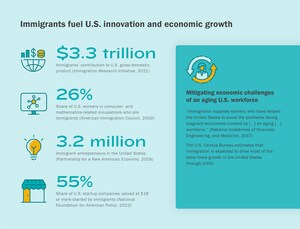Economic Analysis Suggests That a National Clean Electricity Payment Program Could Contribute $907 Billion to US Economy and Support 7.7 Million Jobs by 2031
BOSTON, Sept. 9, 2021 /PRNewswire/ -- A study released today from experts at Analysis Group, one of the largest international economics consulting firms, suggests that a Clean Electricity Payment Program (CEPP) would have a significant, positive impact on the US economy. If Congress adopts the CEPP as part of ongoing budget reconciliation negotiations, the US could expect a $907 billion economic boost; an increase of 7.7 million jobs; increased tax revenues of $154 billion for federal, state and local governments; and investments in solar, wind, and other resources increased by nearly 628 gigawatts by 2031, according to the study authors.
Hard numbers derived from rigorous economic analysis are an essential tool for legislators as they debate proposals to meet the Biden Administration's goal of a 50% reduction of carbon emissions by 2030. The study, "Economic Impact of a Clean Electricity Payment Program," analyzes the level of investment and changes in power system operations associated with implementation of a national CEPP over a 10-year period, including investments in and operation of eligible resources. The CEPP is designed to incentivize an average of 80% low- or zero-greenhouse gas emissions generating resources by 2030.
"Our modeling analyzes region-specific clean electricity trajectories to estimate what a national impact might look like, with a focus on potential changes in the capital and operating costs of new and existing power generating resources," said lead study author, Pavel Darling, a vice president with Analysis Group. "The results show clear increases over time, relative to a business-as-usual scenario, in the development and operation of clean generating resources and storage, with substantial economic benefits to the country in the form of increased GDP and new jobs."
Other takeaways from the study include:
- A CEPP has the potential to spur both immediate and continuous investments in new electric generating technologies as retail suppliers are incentivized to meet performance goals. The economic benefits arise from the direct investment of dollars to build and operate CEPP-eligible resources, and from additional economic activity generated as these initial investments ripple through the economy in the form of, for example, increased spending of labor income earned from the new jobs.
- A CEPP would spur deployment of solar, storage, and on-shore wind, while also driving demand for newer, innovative technologies such as offshore wind and low- or zero-emissions fuels. By 2031, the average annual electric generation from renewables would be about 1.5 times more than renewable generation in 2020, relative to a business-as-usual case, with substantial investments made in all regions of the country.
- A CEPP would reduce energy and economic supply chain risk and provide an opportunity to create energy sector jobs in every region. Growth in CEPP-compliant technologies will lead to accelerated development of energy sources and technologies that rely primarily on domestic manufacturing and materials industries. This shift would reduce supply chain risks and reliance on concentrated supply sectors and yield economic activity driving energy supply and use across all regions of the country.
In addition to the economic benefits, the CEPP would increase the production and use of electricity without greenhouse gas emissions or other pollutants, a step in the right direction for improving air quality and meeting climate goals. CEPP investments would also facilitate decarbonization of the nation's electricity systems at a time when they will need to absorb additional demand from electrification of the transportation and building sectors, and increasingly the industrial sector.
The study was supported by a team of Analysis Group consultants, including Principal Paul Hibbard, Mr. Darling, and Senior Analyst Luke Daniels. Funding was provided by the Natural Resources Defense Council and Evergreen Collaborative.
To learn more about Analysis Group's capabilities, visit AnalysisGroup.com
About Analysis Group:
Analysis Group is one of the largest international economics consulting firms, with more than 1,000 professionals across 14 offices in North America, Europe, and Asia. Since 1981, we have provided expertise in economics, finance, health care analytics, and strategy to top law firms, Fortune Global 500 companies, and government agencies worldwide. Our internal experts, together with our network of affiliated experts from academia, industry, and government, offer our clients exceptional breadth and depth of expertise.
Contact:
Analysis Group
Eric Seymour, +1 978 273 6049
[email protected]
SOURCE Analysis Group

Related Links
WANT YOUR COMPANY'S NEWS FEATURED ON PRNEWSWIRE.COM?
Newsrooms &
Influencers
Digital Media
Outlets
Journalists
Opted In






Share this article